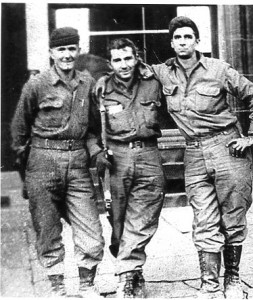
I waited on the Gare de L’Est Station platform. The train to Rheims would leave momentarily. I stayed at the far end, worried about M.P.’s. I had been AWOL, absent without leave, for two weeks. As soon as I boarded that train I would be safe. There was constant confusion due to troop redeployment. I would just slip back into the crowd at Camp Boston; no one would know I had been gone.The war had ended in August. Thank God, Harry Truman had them drop the atomic bomb. That was one of the greatest things that had ever happened to men in the U.S. military. Like most infantrymen I had expected to die on the beaches of Japan. Millions of Americans were headed home. The redeployment camps shifted into high gear, shipping everyone back to the States. Tens of thousands arrived and departed these camps weekly. This huge shuffle of men and units made for massive confusion and clerical errors.
My combat unit, my wartime family, had been deactivated months earlier. We were transferred from one paper unit to another as the army was contracted. We had no duties. You sat in a tent among hundreds of other tents. Some days the weather was clear. More often, as the fall progressed, it was dreary, overcast and depressing. You could sleep all day. You could read, play cards; go to the PX – what ever you chose to do. It was a boring, uneventful life. Due to the constant shuffle of men from one unit to another you knew no one, you had no friends. It could drive you crazy. You waited in limbo. You were in a time warp.
Rather than going stir crazy in camp I had spent recent weeks partaking the joys of Paris. Three-day passes were plentiful. After a while though going back and forth became a nuisance. Why not just stay in Paris? I had nothing else to do but sit in a tent and wait. But how to do it? The answer: liberate a blank pad of passes and write my own liberty passes. Everything was so screwed up who would ever know.
As a result I had a wonderful time in recent weeks. Paris sun-lit cafes were full. The company was great, the French girls exciting and accommodating. There was lots of wine and cognac. Money was available through the black market. As the song goes: “Summer time, life is easy and the days are long.” What more could a twenty two year old want? Don’t worry about tomorrow. Live for today. Now I had to get back to camp. I knew I was stretching my luck. Once there I would be OK. My immediate danger was Military Police on the look out for AWOL’s.The train’s engine whistled. It was time to go. I hurried to board. Two M.P.’s appeared-l hadn’t spotted them. “Soldier-let’s see your papers”. I gave them the pass I had forged a couple of days earlier.
“This says you were due back in Camp Boston at noon today. It’s two PM now. You’re kind of late aren’t you Malloy?” “I’m on my way on that train. I’ll be in camp by four. There won’t be a problem.” The other MP, said to his partner,” He’s absent without leave by his own admission.” The first MP, “I think you better come along with us. We’re going to check you out.”
I got in their jeep. We traveled a couple of miles and arrived in front of an old, forbidding looking, fortress-like, building. It must have been two hundred years old. We went inside. They stood me in front of a tall desk. An older be-speckled Gl looked down at me. “What have you got him for?” “AWOL by his own admission.” “Book him.'” “OK Sarge.” They took me to another area. “Empty your pockets of everything you got on you.” They searched me. They took my billfold, my watch, my barracks bag and some other things. They sealed them in a package. I signed it. “Take off your shoestrings.” “Why?” “Shut your mouth and do as you are told.”
They walked me down a long, dark passageway, the high walls cold and dank. A cell door as opened. They shoved me in. The gate to freedom clanged shut behind me. I entered my cage. There were nine other prisoners. I spotted the spare bunk and climbed into it. What happens now? Here I am-how do I keep it together? All I had were the clothes on my back and the small bag the MPs had confiscated. A Pfc. in the infantry didn’t have much or need much. Uncle Sam took care of him.
The cell was a bleak, barren space. There were eight double bunks. The ceiling was high, the single window barred. There was a sink and toilet stool in the corner-no walls or door. You had to do your job in full view. Three light bulbs, hung from the ceiling, provided light. .
We were in a holding tank. The Military Police gathered those violating military law and held them here until transferred back to their unit. Their company commander would confer punishment-from minor detention, to a major court martial with prison time. It was clear the key to getting out of this place was to make your unit aware you were held here. Most men would leave in less than a week.
My problem was I had three new company commanders who had come and gone. No one in command at Camp Boston knew me. The turnover among all personnel was constant. No one knew anyone. When men arrived, some shipped out immediately; all had to wait until their number came up. My hope now was that some one at Camp Boston would know me and get me transferred back there. I didn’t know who that person might be. Nothing happened for two days. On the third day a guard shouted through the door. “Malloy, front and center.” A guard walked me to an office. A Gl clerk sat at his desk. “Sit down. I want you to tell me what outfit you really belong to. We couldn’t find you in Camp Boston. And don’t lie to me. It will only make it worse.”
I explained I had been transferred in name only to different outfits. That was normal procedure. Soldiers with too few points for discharge were transferred on paper to a new unit. I had given up trying to keep track of all that. I told him, “With all the confusion in Camp Boston the best bet would be to try to track me through my former combat outfit, the 291st Regiment.” I could tell he thought I was lying. Back to my cell, this time for days. Three weeks crawled by and still no word. I felt a terrible isolation. Depression swallowed me. As time passed I fell into the black abyss of despair. Now I understood why they took my shoestrings, they wanted to prevent an attempt at suicide.
As the days passed, I went to the window and pushed my hand out as far as I could-at least part of me was outside this hellhole. Still no word. I lost track of time. I gave up hope. I would rather die than live like this. I heard a bird one day. Oh to be a bird. One day: ” Malloy, front and center!” They took me back to the clerk. I signed for my personal effects. They gave me my bag. They told me nothing. “Get in the jeep.” We drove east for two hours. The M.P.’s ignored me. What now? There it was-Camp Boston-home. The M.P.’s turned me over to the company clerk. He signed a receipt for his prisoner.
A Captain I had never seen appeared. He looked at me. “So you are Malloy, the guy who has been AWOL for more than a month. You and your buddies have cost me more trouble than you will ever know. I have had my ass chewed out because of the likes of you. I’m going to make an example of you. It will put the fear of God into anyone else who thinks like you.” The Captain called out, “Sergeant Eisenberg come out here.” My God, it was my old First Sergeant from the 291st. All at once I saw hope.
“This is one of that AWOL crowd. See this bum is put under guard. I’ll deal with him when I return from Paris next week.” “Yes Sir,” Eisenberg said. Eisenberg didn’t acknowledge me. I kept my mouth shut. A guard took me to my tent. I knew no one. I sat on my cot. It felt good. Now what? Several hours later a corporal appeared.” I’ll take over,” he told the guard. “Grab your gear, Malloy, all of it.” He had a jeep. We drove for an hour.
We arrived at Camp Baltimore. We went to Company Headquarters and found the First Sergeant. “Sergeant I’m delivering this fellow from Camp Boston. Eisenberg said he had talked with you about him.” “OK, I’ll sign for him. Welcome to your new outfit, Malloy. Eisenberg and I are old buddies. He gave me a good report on you.” The Corporal turned to leave. “Malloy keep your mouth shut. Eisenberg said to tell you good luck. He also told me to tell you to walk the straight and narrow from now on.”
Army officers give commands but the Army is run by the noncoms. I was free and clear-Hallelujah! After all these years, I still have a special place in my heart for Eisenberg. I still can feel cold fear in my bones when I recall that desolate old French prison. I’ve walked the straight and narrow for more than sixty-five years. I learned recently Eisenberg, like so many of my comrades, had died. Time marches on.
Browse Malloy’s book at Amazon.com “Making John A Soldier.”
John P. Malloy 291st HQ Co. 75th Division
Contact author: mapj12@gmail.com
